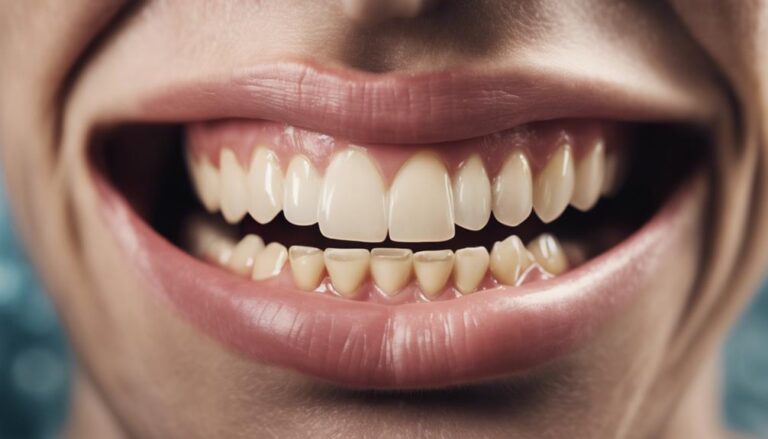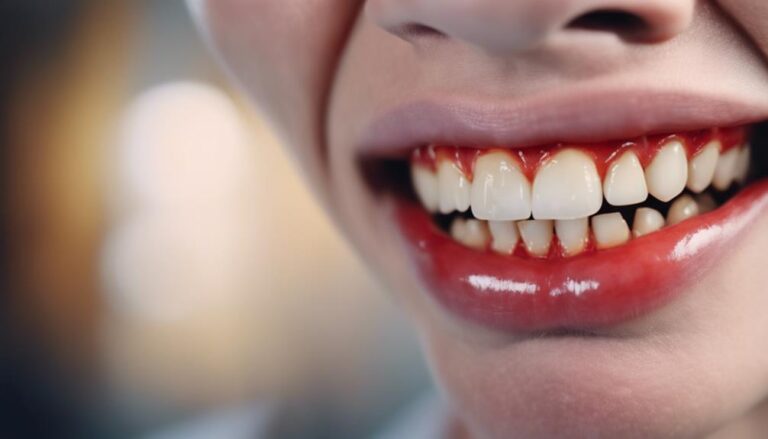Neglecting my oral hygiene can lead to gum disease, resulting in bad breath and potential harm to my overall oral health. Bacteria thrive when oral care is ignored, forming plaque that hardens into tartar without proper cleaning. Gingivitis, the initial stage of gum disease, can progress to periodontitis if left unchecked. Regular dental check-ups are essential for early detection and intervention. Factors like poor oral hygiene, smoking, diabetes, and genetics increase the risk. Adopting effective oral hygiene practices, maintaining good lifestyle habits, and seeking professional treatment for advanced gum disease are important steps. Your oral health journey awaits further exploration.
Key Takeaways
- Neglected oral hygiene leads to plaque buildup and gum inflammation.
- Regular brushing, flossing, and dental check-ups prevent gum disease.
- Bad breath and receding gums signal early gum issues.
- Balanced diet and stress reduction support healthy gums.
- Genetic predisposition and lifestyle habits impact gum health.
The Link Between Oral Hygiene and Gum Disease
In my experience as a dental professional, maintaining good oral hygiene plays a crucial role in preventing gum disease. Oral bacteria, which naturally reside in the mouth, can multiply rapidly when proper oral hygiene practices are neglected. These bacteria feed on food debris left in the mouth, forming a sticky film called plaque. If plaque isn’t removed through regular brushing and flossing, it can harden into tartar, leading to gum inflammation.
Gum inflammation, also known as gingivitis, is the initial stage of gum disease. When plaque and tartar accumulate along the gumline, they can irritate the gums, causing redness, swelling, and tenderness. If left untreated, gingivitis can progress to periodontitis, a more severe form of gum disease that can result in gum recession, bone loss, and even tooth loss.
Understanding Periodontitis and Gingivitis
Understanding the differences between periodontitis and gingivitis is essential for maintaining excellent oral health. Gingivitis is the early stage of gum disease characterized by inflammation of the gums due to plaque buildup. Without proper treatment, gingivitis can progress to periodontitis, a more severe form of gum disease that affects the bone supporting the teeth. To prevent gum disease, it’s vital to practice good oral hygiene, including regular brushing, flossing, and dental check-ups.
Gum disease prevention involves removing plaque through proper oral care routines. Brushing twice a day with a fluoride toothpaste, flossing daily, and using an antiseptic mouthwash can help prevent gum disease. Additionally, maintaining a balanced diet and avoiding tobacco products are essential for oral health awareness.
Early detection and treatment of gum disease are key to preventing its progression. By understanding the differences between gingivitis and periodontitis and practicing good oral hygiene habits, individuals can protect their gums and teeth from the damaging effects of gum disease.
Signs of Early Gum Disease
Early signs of gum disease may include red, swollen, or tender gums that bleed during brushing or flossing. If left unaddressed, these symptoms can progress to more severe forms of gum disease. Early intervention is vital in preventing the escalation of gum disease. In addition to redness, swelling, tenderness, and bleeding, other signs to watch for include persistent bad breath, receding gums, changes in your bite, and the formation of deep pockets between your teeth and gums.
To combat early gum disease, implementing preventive measures is essential. This includes maintaining a thorough oral hygiene routine with regular brushing, flossing, and mouthwash use. Moreover, incorporating a balanced diet rich in vitamins and minerals can support gum health. Avoiding tobacco products and reducing stress levels can also contribute to preventing gum disease.
Importance of Regular Dental Check-ups
Regular dental check-ups are an essential component of maintaining excellent oral health and preventing potential dental issues from escalating. These routine visits play an important role in early detection of problems, allowing for timely intervention and treatment. Through regular check-ups, dentists can assess your oral health, address any concerns, and provide guidance on proper oral hygiene practices. Additionally, these appointments enable the dentist to clean your teeth thoroughly, removing plaque and tartar buildup that can lead to gum disease and bad breath.
For individuals experiencing dental anxiety, it’s important to communicate your fears with your dentist. Dental anxiety management techniques, such as relaxation methods or sedation options, can help alleviate stress and make the check-up experience more comfortable.
Advancements in technology in dentistry have revolutionized preventative care. From digital X-rays for detailed imaging to intraoral cameras for better visualization, these tools aid in early diagnosis and personalized treatment plans during check-ups. Embracing regular dental check-ups not only promotes oral health but also contributes to overall well-being.
Risk Factors for Gum Disease
Factors such as poor oral hygiene habits, smoking, diabetes, and genetic predisposition can greatly enhance the risk of developing gum disease. Poor oral hygiene, including inadequate brushing and flossing, allows plaque to build up, leading to gum inflammation.
Smoking not only weakens the immune system but also restricts blood flow to the gums, impairing their ability to fight infection and heal. Individuals with diabetes are more prone to infections, including gum disease, due to poorly controlled blood sugar levels that compromise the body’s immune response.
Genetic predisposition plays a role in determining the strength of your gums and how susceptible they’re to disease.
Diet also influences gum health, with a diet high in sugars and processed foods promoting bacterial growth and inflammation in the gums. Smoking has detrimental effects on gum health by reducing blood flow and compromising the immune system’s ability to combat infections. Understanding and addressing these risk factors is essential in preventing the development and progression of gum disease.
Impact of Poor Oral Hygiene on Gums
Insufficient oral hygiene practices can lead to a buildup of plaque and bacteria, causing inflammation and potential damage to the gums. This impact highlights the critical importance of maintaining good gum health through a consistent oral care routine.
Here are some key points worth noting:
- Regular Brushing and Flossing: Brushing at least twice a day and flossing daily helps remove plaque and prevent bacteria buildup.
- Routine Dental Check-ups: Regular visits to the dentist for professional cleanings and check-ups can help detect early signs of gum disease.
- Proper Technique: Ensuring proper brushing technique and using fluoride toothpaste aids in effective plaque removal.
- Healthy Lifestyle Habits: Maintaining a balanced diet and avoiding tobacco products support overall gum health maintenance.
Preventive Measures for Gum Disease
Maintaining excellent gum health requires consistent adherence to preventive measures that help combat gum disease effectively. One vital aspect is dietary habits. A diet rich in fruits, vegetables, and lean proteins can provide essential nutrients for gum health. Avoiding sugary snacks and beverages helps prevent plaque buildup, reducing the risk of gum disease. Additionally, staying hydrated promotes saliva production, which aids in washing away food particles and bacteria that can lead to gum issues.
Stress management is another key element in preventing gum disease. High-stress levels can weaken the immune system, making the gums more susceptible to infections. Engaging in stress-reducing activities like meditation, exercise, or spending time on hobbies can help maintain overall well-being, including gum health. Furthermore, stress management techniques can lower the likelihood of habits like teeth grinding, which can damage the gums over time.
Connection Between Bad Breath and Gum Disease
The link between bad breath and gum disease is often underestimated, but it can be indicative of underlying oral health issues that require attention. When bad breath persists despite regular brushing, it may be a sign of gum disease. Here are some key points to bear in mind in understanding the connection between bad breath and gum disease:
- Improper oral hygiene: Neglecting proper brushing and flossing can lead to the accumulation of bacteria in the mouth, causing bad breath and contributing to gum disease.
- Use of breath fresheners and mouthwashes: While these products can help temporarily mask bad breath, they don’t address the root cause of the issue, which may be gum disease.
- Effective flossing techniques: Proper flossing helps remove food particles and plaque from between teeth, reducing the risk of gum disease and bad breath.
- Tongue scraping: Cleaning the surface of the tongue can help eliminate bacteria that contribute to bad breath and gum disease.
Understanding the connection between bad breath and gum disease is essential for maintaining excellent oral health.
Chronic Halitosis and Periodontal Health
Chronic halitosis, commonly known as persistent bad breath, can serve as a warning sign of underlying issues with periodontal health. When bad breath persists despite regular oral hygiene practices, it may indicate the presence of periodontal disease. Periodontal maintenance is vital in managing chronic bad breath associated with gum disease. This involves thorough cleaning of the teeth and gums to remove plaque and tartar buildup, which are breeding grounds for odor-causing bacteria. Additionally, regular dental check-ups are essential to monitor the health of the gums and address any issues promptly.
Proper oral hygiene habits, including brushing at least twice a day, flossing daily, and using an antimicrobial mouthwash, can help control chronic bad breath. However, if bad breath persists, it’s important to seek professional dental care. A dentist can provide a detailed evaluation, determine the underlying cause of the halitosis, and recommend appropriate treatment to improve periodontal health and eliminate bad breath.
Treatment Options for Advanced Gum Disease
When addressing advanced gum disease, the treatment options available vary depending on the severity of the condition and the individual’s overall oral health. It’s important to consult with a dental professional to determine the most appropriate course of action.
Some common treatment options for advanced gum disease include:
- Surgical Intervention: In severe cases, surgical procedures may be necessary to remove deep-seated tartar and bacteria from below the gum line.
- Laser Therapy: This minimally invasive procedure uses laser technology to target and remove infected gum tissue while promoting healing.
- Antibiotic Treatment: Antibiotics can be prescribed to help eliminate bacteria causing the infection and reduce inflammation.
- Deep Cleaning (Scaling and Root Planing): This procedure involves a thorough cleaning of the teeth, including scaling to remove plaque and tartar, and root planing to smooth out the tooth roots and help the gums reattach to the teeth.
These treatment options, either used alone or in combination, aim to halt the progression of advanced gum disease and restore oral health.
Role of Plaque in Gum Disease Development
Plaque buildup on teeth plays an important role in the development of gum disease. When plaque, a sticky film containing bacteria, isn’t adequately removed through proper oral hygiene practices, it can harden into tartar, leading to irritation and inflammation of the gums. The bacteria within plaque produce toxins that can damage the gums, causing them to become red, swollen, and prone to bleeding. As gum disease progresses, it can result in more severe issues such as gum recession, bone loss, and eventual tooth loss.
Preventing plaque formation is essential for maintaining excellent gum health. Regular brushing and flossing help remove plaque before it can cause damage, while professional dental cleanings can effectively eliminate hardened tartar. Additionally, using antimicrobial mouth rinses can help reduce oral bacteria levels and support gum health. By prioritizing plaque prevention through consistent oral hygiene practices, individuals can greatly lower their risk of developing gum disease and experiencing associated oral health complications.
Lifestyle Habits and Gum Health
Maintaining healthy lifestyle habits is essential for excellent gum health and overall well-being. When it comes to gum health, two important factors to take into account are diet choices and stress management. Here are some key points to keep in mind:
- Diet Choices: Consuming a balanced diet rich in fruits, vegetables, lean proteins, and whole grains can benefit not only your overall health but also your gum health. Avoiding sugary snacks and beverages can help prevent plaque buildup and reduce the risk of gum disease.
- Stress Management: High levels of stress can weaken the immune system and make you more susceptible to gum infections. Implementing stress-reducing techniques such as exercise, meditation, or mindfulness practices can help lower stress levels and improve gum health.
Genetic Predisposition to Gum Disease
Understanding the significance of genetic predisposition in gum disease is essential for evaluating individual susceptibility and implementing targeted preventive measures. Genetic factors play a key role in influencing gum health, with certain individuals being predisposed to inherited risks of periodontal disease. These genetic predispositions can impact the immune response, inflammatory pathways, and tissue integrity within the oral cavity, making some individuals more prone to developing gum issues despite maintaining good oral hygiene habits.
Research suggests that specific gene variations can increase the likelihood of developing gum disease, even in individuals who diligently follow oral care routines. Individuals with a family history of periodontal disease should be particularly vigilant about their gum health and seek regular dental check-ups to detect any signs of gum disease early on.
While genetic predisposition can elevate the risk of gum problems, it’s essential to remember that proactive oral care practices such as regular brushing, flossing, and professional cleanings remain pivotal in preventing and managing gum disease, even for those with inherited risks.
Systemic Diseases and Gum Health
Systemic diseases can greatly impact gum health, leading to various oral complications that require careful management and monitoring. Understanding the systemic implications of these conditions is vital for maintaining good oral health. Here are some key points to keep in mind:
- Diabetes: Uncontrolled diabetes can weaken the body’s ability to fight infections, making gums more susceptible to disease.
- Cardiovascular Disease: Research suggests a link between gum disease and heart problems, emphasizing the importance of oral health in preventing systemic conditions.
- Autoimmune Disorders: Conditions like rheumatoid arthritis can affect the gums, highlighting the need for preventive strategies to maintain gum health.
- Hormonal Changes: Hormonal fluctuations, such as those during pregnancy or menopause, can increase the risk of gum disease, underscoring the importance of tailored oral hygiene routines.
Maintaining Good Oral Hygiene Practices
Proper oral hygiene practices play an essential role in preserving the health of your teeth and gums. Consistent brushing techniques and flossing tips are key components of a solid oral care routine. When brushing, use gentle circular motions to clean each tooth thoroughly, reaching the front, back, and chewing surfaces. Remember to replace your toothbrush every 3-4 months or sooner if the bristles appear frayed. Flossing should be done at least once a day to remove plaque and food particles from between teeth, where your toothbrush can’t reach.
Below is a table summarizing essential oral hygiene practices:
| Oral Hygiene Practice | Description | Frequency |
|---|---|---|
| Brushing Techniques | Circular motions for each tooth | At least twice a day |
| Flossing Tips | Clean between teeth thoroughly | At least once a day |
| Mouthwash Benefits | Reduce bacteria and freshen breath | Once a day after brushing |
| Tongue Cleaning | Scrape or brush the tongue surface | Once a day after brushing |
In addition to brushing and flossing, incorporating mouthwash benefits your oral health by reducing bacteria and freshening breath. Don’t forget to clean your tongue either by scraping or brushing the surface to remove bacteria and prevent bad breath.
Frequently Asked Questions
Can Gum Disease Lead to Serious Health Complications?
Yes, gum disease can lead to serious health complications. There is a correlation between gum disease and heart disease as well as a connection to diabetes. Proper oral hygiene is essential for overall health.
Are There Any Natural Remedies for Treating Gum Disease?
There are herbal remedies like chamomile and aloe vera known for their anti-inflammatory properties. Oil pulling with coconut oil can reduce bacteria. While these can help, consulting a dentist for proper treatment is essential.
How Often Should I Change My Toothbrush to Prevent Gum Disease?
To maintain good oral health and prevent gum disease, I change my toothbrush every three months. Regular toothbrush maintenance is vital for oral health habits. It guarantees effective cleaning and reduces the risk of bacteria buildup.
Is It Safe to Use Mouthwash as a Substitute for Brushing?
I’ve learned that while mouthwash has its benefits, it’s not a substitute for brushing. Brushing cleans teeth thoroughly, reaching places mouthwash can’t. Mouthwash can complement brushing, but it’s no replacement for the direct effectiveness of good brushing techniques.
Can Stress and Anxiety Contribute to the Development of Gum Disease?
Yes, stress and anxiety can contribute to gum disease. It’s crucial to prioritize stress management for better oral health. High stress levels can weaken the immune system and increase inflammation, impacting gum health.
Conclusion
Maintaining good oral hygiene is vital in preventing gum disease and bad breath. Did you know that nearly half of adults over 30 in the United States have some form of periodontal disease?
Regular dental check-ups, proper brushing and flossing techniques, and healthy lifestyle habits can help keep your gums healthy and your breath fresh. Take care of your oral health to avoid potential complications down the road.






